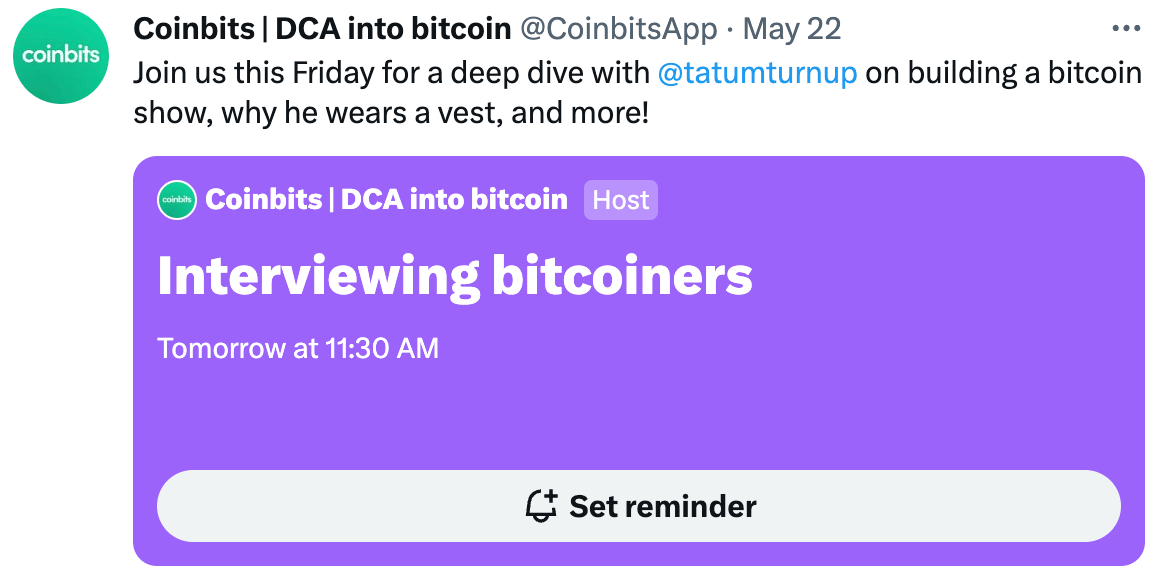- Bitcoin Roundup
- Posts
- 🛟 Ripping off the Band-Aid: Fast or slow? 🩹
🛟 Ripping off the Band-Aid: Fast or slow? 🩹
The collision course of decreased dollar demand and the greatest debt crisis in history will only end one way- a massive rip-off for those still stuck in the traditional financial system.

Bitcoiners,
Consider these remarks by President Obama in 2015:
We cannot dictate the foreign, economic and energy policies of every major power in the world.
In order to even try to do that, we would have to sanction, for example, some of the world's largest banks. We'd have to cut off countries like China from the American financial system. And since they happen to be major purchasers of or our debt, such actions could trigger severe disruptions in our own economy and, by the way, raise questions internationally about the dollar's role as the world's reserve currency.
How much has changed.
On February 24th, 2022, the SWIFT network transformed from a neutral money transfer system to a tool of political leverage. When historians chronicle bitcoin's history, they will mark this event as a turning point.
By weaponizing the dollar, the U.S. has accelerated de-dollarization and hamstrung its ability to fight inflation, pay debts, and stave off recession.
De-dollarization won't happen overnight, and the dollar will go through many ups and downs. But the cake is baked. Decreased dollar demand will combine with greatest debt crisis in history into an unholy admixture. The last question about the coming rip-off is now if, but when, and whether it will happen fast, or slow.
With that, let's dive into the news.
NEWS
There is no debt ceiling
Congressional leadership and President Biden have yet to agree on a solution to dealing with the debt ceiling. Speaker McCarthy stated the two sides are "still far apart" when it comes to what to keep and what to cut from the federal budget. Biden has stated he believes he can invoke the 14th Amendment if necessary.
Between the lines:
The proposed spending "cuts" aren't significant reductions. Instead, for example, they represent cutting 2% of the budget to 1.5% on any particular item – so the government is still increasing the deficit, but just slightly less.
Mainstream media presents Republicans and Democrats as opposing sides, but both still need to maintain their government slush fund – 30 trillion in national debt and over 187 trillion in unfunded liabilities aside.
There is nobody in Washington that believes the debt ceiling should serve as an actual spending constraint – it has become just another tool of political leverage for some factions to stuff their pockets at the expense of others.
Has the number of "whole-coiners" peaked?
The number of bitcoin addresses with at least one whole bitcoin hit one million. Bitcoin held for over a year also reached an all-time high of 68%, with 55% held for two years and 40% for three years.
An all-time high of whole-coiners?
There will never be more than 21 million bitcoins. If the exchange rate of dollars to bitcoin rises significantly in the next halving cycle, it will become harder for any one address to hold a whole bitcoin. Additionally, many of the addresses that do hold at least one whole coin today will spend it down as bitcoin is liquidated to fund business operations and consumer spending. One day, we may look back and find the number of whole-coin addresses peaked in 2023.
IMF loves Nigeria's CBDC, Nigerians don't
Nigeria's eNaira central bank digital currency (CBDC) is over a year old, and adoption has stalled, presenting an inconvenient truth to CBDC advocates worldwide. The International Monetary Fund says the eNaira is "laudable" and has made suggestions to increase adoption. Some key nuggets:
"The average number of eNaira transactions since its inception amounts to about 14,000 per week—only 1.5 percent of the number of wallets out there."
"The total number of retails eNaira wallets amounted to about 860,000. This is just 0.8 percent of Nigeria’s active bank accounts."
In contrast, bitcoin in Nigeria remains strong as Nigerians search for alternatives to a highly inflationary government currency. Unsurprisingly, the IMF report barely mentions bitcoin or the central bank's inability to maintain price stability.
Bitcoin's presidential ambitions
Thirteen years after its inception, bitcoin has become so important that major candidates from both political parties are discussing it in high-profile speeches. Robert F. Kennedy, Jr., a Democratic presidential candidate, laid out a comprehensive bitcoin platform, including defending constitutional rights to own bitcoin, self-custody private keys, run a full node, and keep the U.S. at the forefront of innovation. At the same event, former Democratic congresswoman Tulsi Gabbard spoke out against CBDCs.
Next, Ron DeSantis, the current governor of Florida and a popular Republican candidate defended bitcoin and attacked CBDCs on a Twitter space where he announced his presidential campaign.
TWITTER SPACES
Don't miss our talk with @tatumturnup tomorrow as we dive into his experiences interviewing top bitcoiners and entrepreneurs, his bitcoin journey, and other topics.

BITCOIN ADOPTION CONTINUES
The world's largest bitcoin conference, BTC 2024, will be hosted in Nashville, Tennessee.
BitDeer joined forces with Druk Holding & Investments for a bitcoin mining initiative in the Kingdom of Bhutan.
Hong Kong regulators approved retail bitcoin transactions, contravening mainland China's ban.
NeutronPay and Pouch.ph partnered to provide remittance services between Canada and Vietnam utilizing the Lightning network.
Bit Mining and Chain Reaction developed innovative bitcoin mining systems using Chain Reaction’s ASIC.
HOW BITCOIN WORKS
Learn one key idea about bitcoin each week. This week: Bitcoin is efficient.
Bitcoin's detractors often attack it for wasting energy or creating value out of nothing, which they deem wasteful.
In reality, bitcoin doesn't waste a single watt of energy. All energy used goes toward issuance, network security, and transactions. It is not "flared" or sent out into the atmosphere like other processes. Bitcoin miners can also change their energy intake at will, supporting grid resilience by providing flexible demand response.
Bitcoin's efficiency goes beyond mining – it also incentivizes efficient capital allocation. Money that rises in value changes the calculus of investment. Capital becomes more expensive, because the opportunity cost of investing is leaving money to appreciate rather than melting away due to inflation.
That this is a good thing may sound unintuitive at first. However, as bitcoin makes entrepreneurs more accountable, business and economic growth must become more efficient. There is no rush to spend money on growth to outpace inflation, so business decisions become more measured.
And finally, bitcoin's global network makes the entire economy more efficient. By allowing everyone on the planet to access the same monetary network and use the same language of value exchange, trillions of dollars that are needed to administer the debt-based financial bureaucracy are saved.
Bitcoin's detractors will continue to assail it as wasteful, ineffective, or even superfluous. Yet, they are powerless to halt bitcoin's relentless expansion. Capital seeks efficiency, and its flow into bitcoin is proof that the haters are wrong.
Are you ready to get started with bitcoin? Coinbits is the best option. It's quick, safe, and free to create your account – sign up now.
COIN CHECK
In Bitcoin's scripting language, what is the purpose of the 'OP_RETURN' opcode?
A. It triggers a refund to the sender of the transaction.
B. It marks a transaction output as provably unspendable.
C. It sends the transaction fee back to the miner.
D. It doubles the amount of bitcoin being sent.
Check your answer at the end of the page.
FROM THE MEME POOL

WHAT TO DO NEXT
Want bitcoin? Sign up for Coinbits.
Show your support for Bitcoin wearing our maximalist apparel & accessories! Shop at YGMI shop.
Orange pill the whole family. Get the “Bitcoin for Kiddos” book. 10% off your order with code: Coinbits
Need coffee? Shop Queen City Coffee Roasters and get 15% OFF your order with promo code BITCOINROUNDUP
Want to work with us? Explore careers at Coinbits.
Answer: B. It marks a transaction output as provably unspendable.
OP_Return is a transaction output in Bitcoin that is provably unspendable. The function can be used to burn Bitcoin or store arbitrary data in the Bitcoin blockchain.
